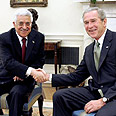
More work needed, writes Kobi Michael
צילום: רויטרס
The Palestinian handicap
Time for Palestinians to stop blaming, develop sense of pragmatism
Mahmoud Abbas’ first visit to the White House as Palestinian Authority chairman appears to be a success, but this could turn out to be a mere mirage.
President George W. Bush’s declarations may serve as a boost to the flawed Palestinian strategy, but without taking responsibility for their destiny and taking initiative aimed at making significant progress toward an independent state, it is doubtful whether the Palestinians would be able to leverage this political opportunity.
Abbas has declared his willingness to coordinate the pullout with Israel, but in line with Palestinian political tradition, he does not forget to repeat and emphasize the list of demands reflecting the ultimate principles for a final-status agreement, while reminding listeners that a democracy cannot be maintained under occupation.
Indeed, coordinating the pullout and implementing it peacefully and through an orderly handover of Israeli assets to the Palestinians - either directly or through a third party - is the optimistic, desired scenario.
However, it is doubtful whether such coordination can turn from vision to deed.
Flawed Palestinian political repertoire
Three main reasons serve as an obstacle to such scenario unfolding: first, a lack of Israeli political will, due to the lack of faith in the Palestinian Authority’s good will and ability to function; second, a lack of American will, despite all the declarations, to display deep involvement in the process.
The Americans estimate chances of the process succeeding are low, and are concerned about their prestige being undermined at other Middle East theaters.
Finally, we have the flawed Palestinian “political repertoire.”
In line with Palestinian political tradition, Abbas presents the ultimate demand, premised on three principles.
The three principles are an Israeli withdrawal to the 1967 borders, east Jerusalem as the future Palestinian capital, and recognition of the Palestinian Right of Return.
However, this insistence to focus the political and public relations effort in a bid to bring Israel to agree on those final-status agreement principles, under conditions where neither Israeli politicians nor the Israeli public are prepared for such demands, is doomed to be another stinging failure.
Take responsibility, Israel won’t wait
A plethora of explanations have been offered for the Palestinian unwillingness to utilize the unilateral disengagement in order to advance its supreme interest, that is, the establishment of an independent state (even if its borders are temporary, as is the case with Israel itself.)
However, all those explanations do not serve to justify the Palestinian attachment to its handicapped political repertoire, a repertoire characterized by institutional paralysis and a lack of any sense of responsibility or pragmatism.
The Palestinian fright when it comes to taking responsibility and the inability to take advantage of political opportunities to promote national interests lead to the perpetuation of a wholly ineffective strategy, narrowed down to improving the efforts to lay the blame on Israel and the occupation.
The time has come for fixing the flawed Palestinian political repertoire. It is time to accept the responsibility, develop pragmatism and look reality in the face.
Indeed, it is time for the Palestinians to separate from the Israelis and act for the establishment of a Palestinian state, organize the activity of political institutions, improve the daily lives of residents, and ensure a state monopoly on the use of military power.
No one except for the Palestinians would do this on their behalf; time is certainly not on their side, and the vision of a Palestinian state could indeed lose its substance.
A Palestinian strategy premised on a corrected code would encourage more active international support and intervention, lead the U.S. administration to translate its declarations to actions, and have a positive impact on Israeli public opinion.
Only then would the Israeli strategy may change, and the unilateral path be replaced by genuine, improved coordination with the Palestinians.
Israel will not be waiting for the Palestinians, and rightfully so. It will not condition its moves on Palestinian good will. Indeed, a Palestinian escape from responsibility would only serve to further disrupt the political repertoire, which is already flawed.
Only separation from Israel would allow the Palestinians to redesign the Palestinian nation in a spirit of independence. Only then, under more symmetrical conditions, and through the “rules of the game” prevalent between two political players would a new type of cooperation - security, economic, infrastructure, or other types - grow.
Dr. Kobi Michael is a fellow at the Jerusalem Institute for Israel Studies and a lecturer in the programs for conflict studies at the Hebrew University and Tel Aviv University.











